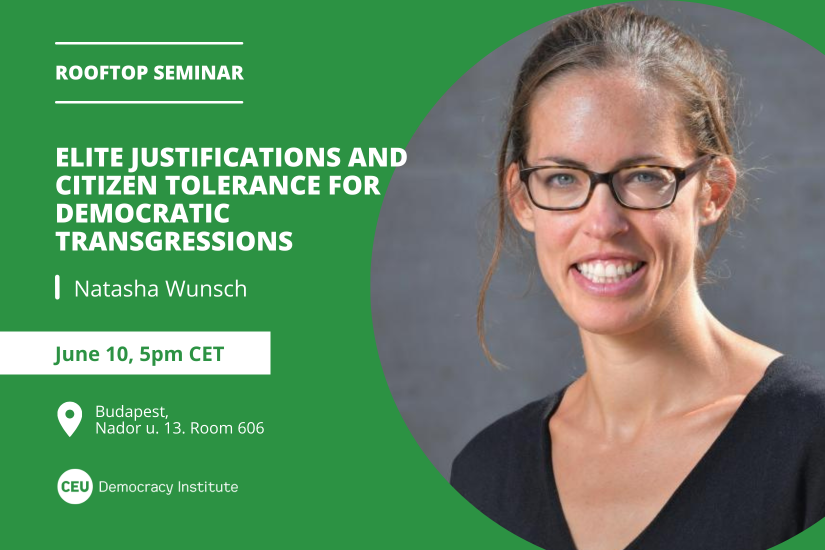
The De- and Re-Democratization (DRD) Workgroup of the CEU Democracy Institute cordially invites you to its next Rooftop Seminar.
You can check our past events here.
If you would like to attend, please register here.
Please keep in mind that external guests cannot enter the building without prior registration. Due to space restrictions, attendance is limited. We ask registered visitors to pick up their temporary visiting card at the reception. The event is not open to the press.
The paper is available upon request from the author.
Abstract:
Can political elites make democratic transgressions more acceptable to voters? Using a vignette experiment in the Czech Republic, we probe how elite justifications affect voters’ evaluations of democratic transgressions and their willingness to continue to support their preferred party once it endorses such measures. Our findings indicate that elite cues play a key role in shaping citizens’ perceptions of the democratic character of proposed transgressions. In turn, their impact on prospective voting decisions is considerably lower. We find significant differences across our four hypothesized mechanisms: voters appear most receptive to direct trade-offs related especially to economic priorities but also stability. Majoritarian appeals are also compelling, albeit somewhat less. Surprisingly, justifications based on partisan affect and keeping the opposition out of power appear to antagonize voters, leading them to reduce both their democratic evaluations and, even more strongly, their likelihood to vote for their in-party. This result contrasts with previous findings on the effects of partisan polarisation and offers important insight into how democratic actors may seek to remobilize voters in favour of the defence of democracy.
Speaker:
Natasha Wunsch is Professor of European Studies and Director of the Center for European Studies at the University of Fribourg. She was previously an Assistant Professor at Sciences Po, Centre for European Studies and Comparative Politics (CEE) and a Senior Researcher with the Center for Comparative and International Studies at ETH Zurich. Her research interests lie at the intersection between European Politics and Comparative Politics, with a particular focus on democratisation and democratic backsliding. She recently completed the research project “Democratic Backsliding in Eastern Europe: Sequence, Strategies, Citizens,” funded by the Swiss National Science Foundation from 2019-2024.
Discussant:
Gabor Toka is a Senior Research Fellow in the Vera and Donald Blinken Open Society Archives at the Central European University, Budapest, Hungary, where he is the curator of a thematic collection of surveys of social and political attitudes. He specializes in the comparative study of voting behaviour, political attitude formation, and political communication and is particularly interested in how the democratic process and mass media can assist citizens in producing election outcomes that faithfully reflect their underlying preferences. His current research interests also include gerrymandering and non-partisan districting, the long-term impact of electoral turnout on election outcomes and public policy, the impact of discursive practices on attitudes towards disliked and/or disadvantaged groups, and developing conceptual and empirical distinctions between civil versus uncivil forms of partisanship.
Chair:
Vera Messing is a research professor at the Institute for Sociology, HUN-REN Center for Social Sciences as well as a research fellow at the Democracy Institute. She earned her PhD in Sociology at Budapest Corvinus University in 2000. Her work focuses on comparative understanding of different forms and intersections of social inequalities and ethnicity and their consequences. She is specifically interested in policy and civil responses to ethnic diversity in the field of education and labour market; migration and migrant integration; attitudes towards racialized minorities and immigrants; media representation of racialized groups and conflicts; social science methodology and measurement of social phenomena. She has been involved in the coordination and research activities for several European comparative research projects in the above topical fields (FP7, H2020) and she is also the lead researcher of the Hungarian team of the European Social Survey, ERIC. She has widely published in academic journals and books.